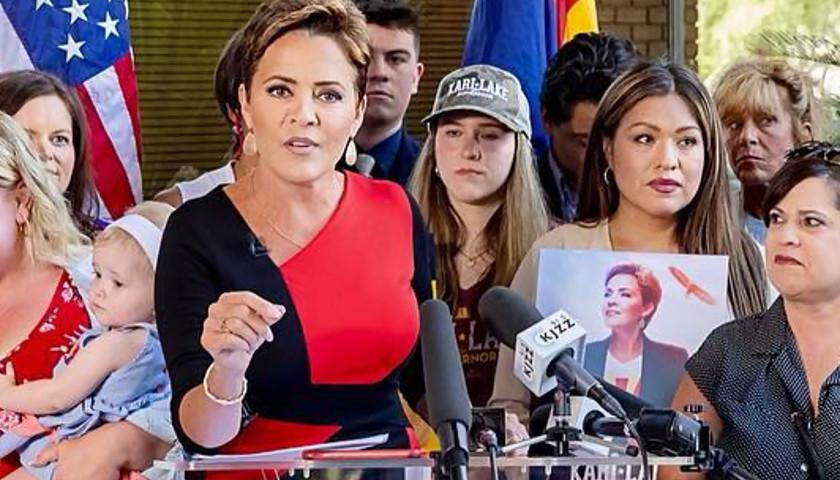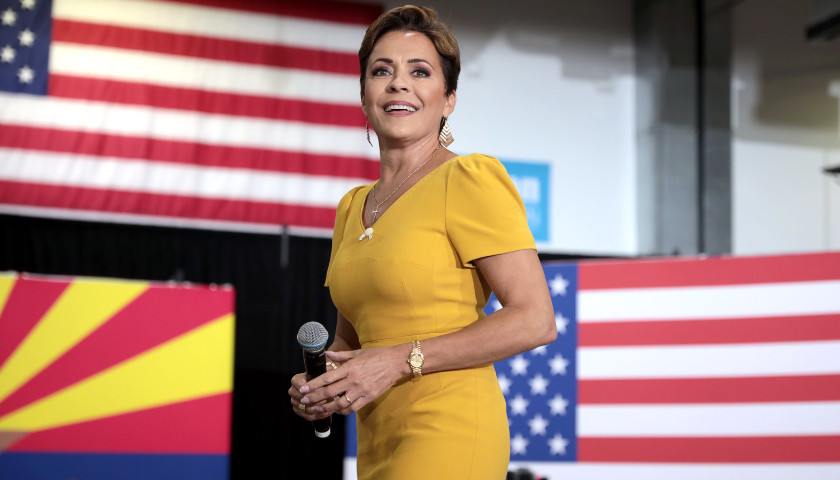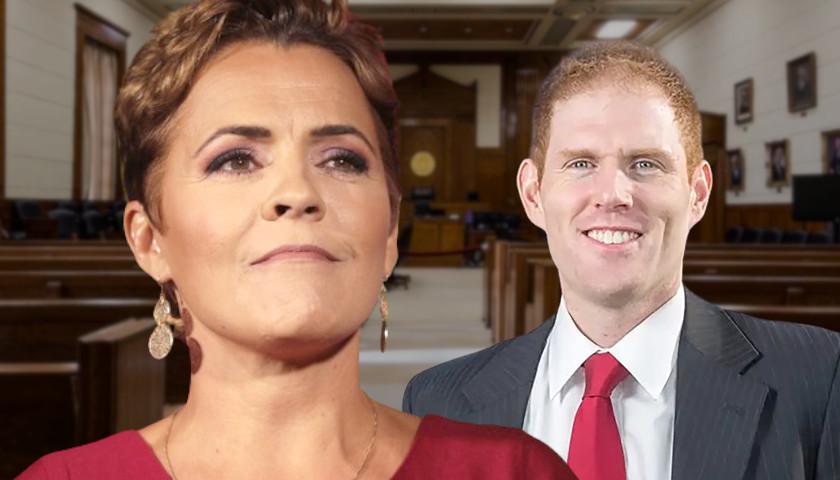After ruling against Kari Lake in a remanded election trial challenging her gubernatorial loss to Katie Hobbs, Maricopa County Superior Court Judge Peter Thompson rejected Maricopa County’s motion for sanctions against Lake on Friday, just three days after their attorneys filed the request. The county’s attorneys asserted that Lake’s team made several false statements to the court. Lake’s attorneys filed a response opposing the request on Thursday.
Thompson laid out the standard for awarding sanctions. He cited A.R.S. § 12-349, which states that sanctions are warranted where a party “brings or defends a claim without substantial justification or primarily for delay or harassment, unreasonably expands or delays the proceeding, or engages in abuse of discovery.” Thompson added, “The statute defines ‘without substantial justification’ as ‘groundless’ and ‘not made in good faith.
Thompson addressed one of the defendants’ claims specifically, but didn’t even bother going over the rest of them, brushing them off in a broad dismissal. The claim he went over was the assertion that “Lake ‘unnecessarily expanded these proceedings’ by intentionally misstating the content of a witness’s testimony in her Rule 60 motion and that she proceeded to trial on a claim she knew lacked factual merit based on her own witness’s statements.” Thompson cited Lake’s accusation that “Maricopa County officials, instead of attempting to cure ballots, systematically pushed mismatched ballots through for tabulation without following the required procedures.”
Thompson disagreed with the defendants’ characterization of the standard for sanctions. He said, “This view mistakenly looks beyond trial to the ultimate resolution of the merits and does not allow for presentation of evidence to prove a disputed claim.”
He explained, “Plaintiff’s failure to establish her claim by clear and convincing evidence does not equate to bringing a claim ‘without substantial justification’ as ‘groundless’ and ‘not made in good faith.’ Even if her argument did not prevail, Lake, through her witness, presented facts consistent with and in support of her legal argument.”
As for the rest of the claims, he said in the short 4-page ruling, “The remainder of Defendants’ allegations appear to rely on the Court’s inherent power as the authority by which they request the Court ‘award’ unspecified sanctions ‘against’ Lake’s counsel.” He said the arguments Lake’s attorneys made did not “stray from advocacy into misconduct,” and pointed out that “[O]pposing litigants in a heated dispute” will “question each other’s good faith motivated simply by their conviction of their own cause and incomprehension at the conclusions of the other.”
The Kari Lake War Room Twitter account tweeted after the news came out, “The Judge has DENIED requests by Maricopa County & Katie Hobbs for sanctions against @KariLake. We knew the Fake News narrative would collapse. Now it has. Kari Lake will NEVER stop fighting to restore election integrity to the people of Arizona!”
Lake’s attorneys argued in their response that defendants must show all three elements: that Lake’s claim (1) constitutes harassment; (2) is groundless; and (3) is not made in good faith.
Lake’s attorneys asserted that the team did not misstate the findings of the McGregor Report. The plaintiffs accused Lake of doing that in order to falsely accuse Maricopa County Elections Director Scott Jarrett of lying on the witness stand. That report was the result of an investigation that Maricopa County officials had retired Arizona Supreme Court Justice Ruth McGregor conduct into the ballot-on-demand printer problems that occurred on Election Day last fall. McGregor’s findings were inconclusive; she was unable to determine why sudden “random” printing of “fit-to-page” ballots commenced. She said, “We could not determine whether this change resulted from a technician attempting to correct the printing issues, the most probable source of change, or a problem internal to the printers.”
Consequently, the McGregor Report was unable to provide confirmation whether the testimony that Jarrett provided was true. Jarrett stated that the fit-to-page issue was caused by technicians changing “printer settings” on Election Day. In contrast, Lake’s attorneys said, “Plaintiff’s cyber expert, Clay Parikh, testified [that] the random fit-to-page printing could only be caused by malware or remote access.” Parikh said the problem could not have been caused by a tech, since it happened to two brands of printers, not just one.
Additionally, Lake’s response pointed out that while Jarrett testified that the printing problem only occurred at three vote centers, “newly produced evidence, including Maricopa County’s election hotline call log, video evidence and Goldenrod reports, identify the ‘fit to page’ issue at 127 vote centers on Election Day.”
Lake’s attorneys said the defendants deliberately mischaracterized their claim that Jarrett made false statements. “Plaintiff’s counsel never stated in briefing or at oral argument ‘that Jarrett lied in his testimony and caused the first judgment to be obtained via fraud,’” the response asserted, adding, “Maricopa is deliberately making these statements up to support its motion for sanctions.” Instead, Lake merely “called out his false testimony.”
Another accusation the defendants made was that Lake deliberately confused “creating ballot definitions in the election management system” with the “‘fit-to-paper’ option when printing.” The team’s response shot back, “Again, Maricopa is deliberately making this statement up, without any support in the record,” citing the dispute over Jarrett’s testimony.
The defendants accused Lake of providing no evidence for her claim that 8,000 ballots that were not configured properly were rejected. They claimed that Lake’s expert Parikh said he could not prove that the ballots were not ultimately counted. Lake’s attorneys explained in the response why there was no evidence, “However, producing these purportedly duplicated ballots would be easy to do if the requirements for maintaining and tracking duplicated ballots found at A.R.S. § 16-621(B)(3) were followed.”
Lake’s attorneys argued that the election was “rigged,” which the defendants claimed had no supporting evidence. In their response, Lake’s attorneys noted that “Plaintiff was not able to present this evidence at trial because the Court denied Plaintiff’s Rule 60 Motion.” They also cited evidence from the county itself. “That evidence includes Maricopa’s tabulator system log files and other Maricopa documents showing that ‘after Maricopa certified it passed L&A testing on October 11, 2022, Maricopa secretly tested all 446 vote center tabulators on October 14th, 17th, and 18th, and knew that 260 of the vote center tabulators would fail on Election Day.’” The response asserted that even though the county knew of the problems, they went ahead with the election knowing voters would face long lines due to the tabulation problems.
Finally, Lake’s attorneys addressed the defendants’ claim that Lake failed to show that there was zero signature verification taking place. They said Lake never claimed she was going to show that. “Plaintiff argued that under Reyes v. Cuming, 191 Ariz. 91 (App. 1998), these 276 thousand ballots were illegally counted,” they said. “Contrary to Maricopa’s argument, Plaintiff never argued that ‘no signature verification was conducted’ on all 1.3 million mail-ballots.”
Lake said she intends to appeal Thompson’s ruling throwing out her lawsuit.
– – –
Rachel Alexander is a reporter at The Arizona Sun Times and The Star News Network. Follow Rachel on Twitter. Email tips to [email protected].
Photo “Kari Lake Press Conference” by Kari Lake.





